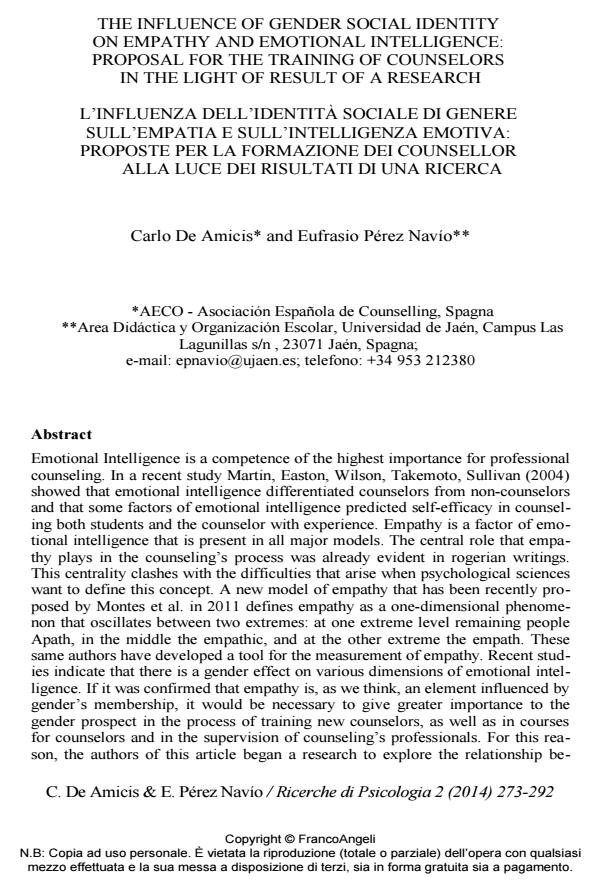The influence of gender social identity on empathy and emotional intelligence: proposal for the training of counselors in the light of result of a research
Titolo Rivista RICERCHE DI PSICOLOGIA
Autori/Curatori Carlo De Amicis, Navìo Eufrasio Pérez
Anno di pubblicazione 2015 Fascicolo 2014/2
Lingua Inglese Numero pagine 20 P. 273-292 Dimensione file 252 KB
DOI 10.3280/RIP2014-002003
Il DOI è il codice a barre della proprietà intellettuale: per saperne di più
clicca qui
Qui sotto puoi vedere in anteprima la prima pagina di questo articolo.
Se questo articolo ti interessa, lo puoi acquistare (e scaricare in formato pdf) seguendo le facili indicazioni per acquistare il download credit. Acquista Download Credits per scaricare questo Articolo in formato PDF

FrancoAngeli è membro della Publishers International Linking Association, Inc (PILA)associazione indipendente e non profit per facilitare (attraverso i servizi tecnologici implementati da CrossRef.org) l’accesso degli studiosi ai contenuti digitali nelle pubblicazioni professionali e scientifiche
Emotional Intelligence is a competence of the highest importance for professional counseling. In a recent study Martin, Easton, Wilson, Takemoto, Sullivan (2004) showed that emotional intelligence differentiated counselors from non-counselors and that some factors of emotional intelligence predicted self-efficacy in counseling both students and the counselor with experience. Empathy is a factor of emotional intelligence that is present in all major models. The central role that empathy plays in the counseling’s process was already evident in rogerian writings. This centrality clashes with the difficulties that arise when psychological sciences want to define this concept. A new model of empathy that has been recently proposed by Montes et al. in 2011 defines empathy as a one-dimensional phenomenon that oscillates between two extremes: at one extreme level remaining people Apath, in the middle the empathic, and at the other extreme the empath. These same authors have developed a tool for the measurement of empathy. Recent studies indicate that there is a gender effect on various dimensions of emotional intelligence. If it was confirmed that empathy is, as we think, an element influenced by gender’s membership, it would be necessary to give greater importance to the gender prospect in the process of training new counselors, as well as in courses for counselors and in the supervision of counseling’s professionals. For this reason, the authors of this article began a research to explore the relationship btween gender belonging, gender role, empathy and emotional intelligence. The subjects were 66 university students of the Degree Course in Teaching of the University of Jaen. The results so far obtained, indicate a clear influence of the gender factor on emotional intelligence in general and on empathy in particular.
L’Intelligenza Emotiva e una competenza della massima importanza nel counselling professionale. In un recente studio Martin, Easton, Wilson, Takemoto, e Sullivan (2004) dimostrarono che l’intelligenza emotiva differenziava i counsellor dai non counsellor ed inoltre che alcuni fattori dell’intelligenza emotiva predicevano l’auto-efficacia nel counselling sia nel caso di studenti sia in quello di counsellor con esperti. L’empatia e un fattore dell’intelligenza emotiva presente in tutti i principali modelli. La centralita che l’empatia riveste nel processo di counselling, era gia evidente negli scritti rogersiani. Tale centralita si scontra con le difficolta che le scienze psicologiche manifestano quando vogliono definire tale concetto. Un nuovo modello di Empatia che e stato recentemente proposto da Berges Montes nel 2011 definisce utilizzando una nuova terminologia, l’empatia come un fenomeno unidimensionale che oscilla fra due estremi: in un estremo si situerebbero le persone cosiddette "Apate", nel mezzo le Empatiche e nell’altro estremo le "Empate". Berges Montes ha inoltre elaborato uno strumento per la misura dell’empatia. Recenti studi indicherebbero che vi e un’influenza del genere su varie dimensioni dell’Intelligenza Emotiva. Se si confermasse che l’empatia e, come pensiamo, un elemento influenzato dall’appartenenza di genere, sarebbe necessario dare una maggior rilevanza alla prospettiva di "genere" nel processo di formazione dei nuovi counsellor, cosi come nei corsi di aggiornamento e di supervisione dei professionisti del counselling. Per tale ragione, gli autori del presente articolo hanno iniziato una ricerca per approfondire la relazione esistente, tra appartenenza di genere, identita sociale di genere, empatia ed intelligenza emotiva. Alla ricerca hanno partecipato studenti del Corso di Laurea in Magistero della universita di Jaen. I risultati finora raccolti indicano una chiara influenza del fattore genere sia sull’intelligenza emozionale in generale come sull’empatia nello specifico.
Parole chiave:Intelligenza emotiva, stereotipo di genere, counselling, empatia
Carlo De Amicis, Navìo Eufrasio Pérez, The influence of gender social identity on empathy and emotional intelligence: proposal for the training of counselors in the light of result of a research in "RICERCHE DI PSICOLOGIA " 2/2014, pp 273-292, DOI: 10.3280/RIP2014-002003